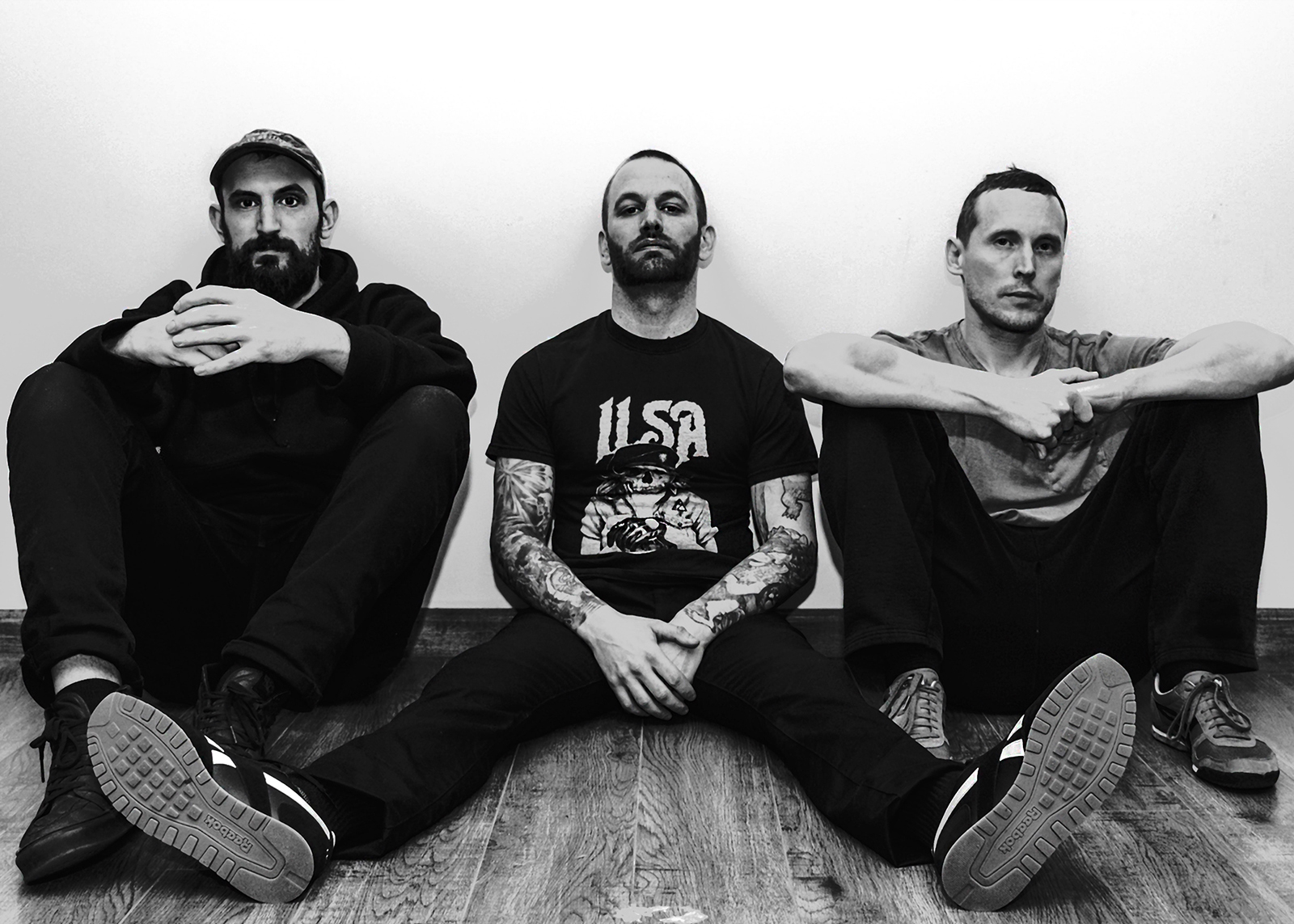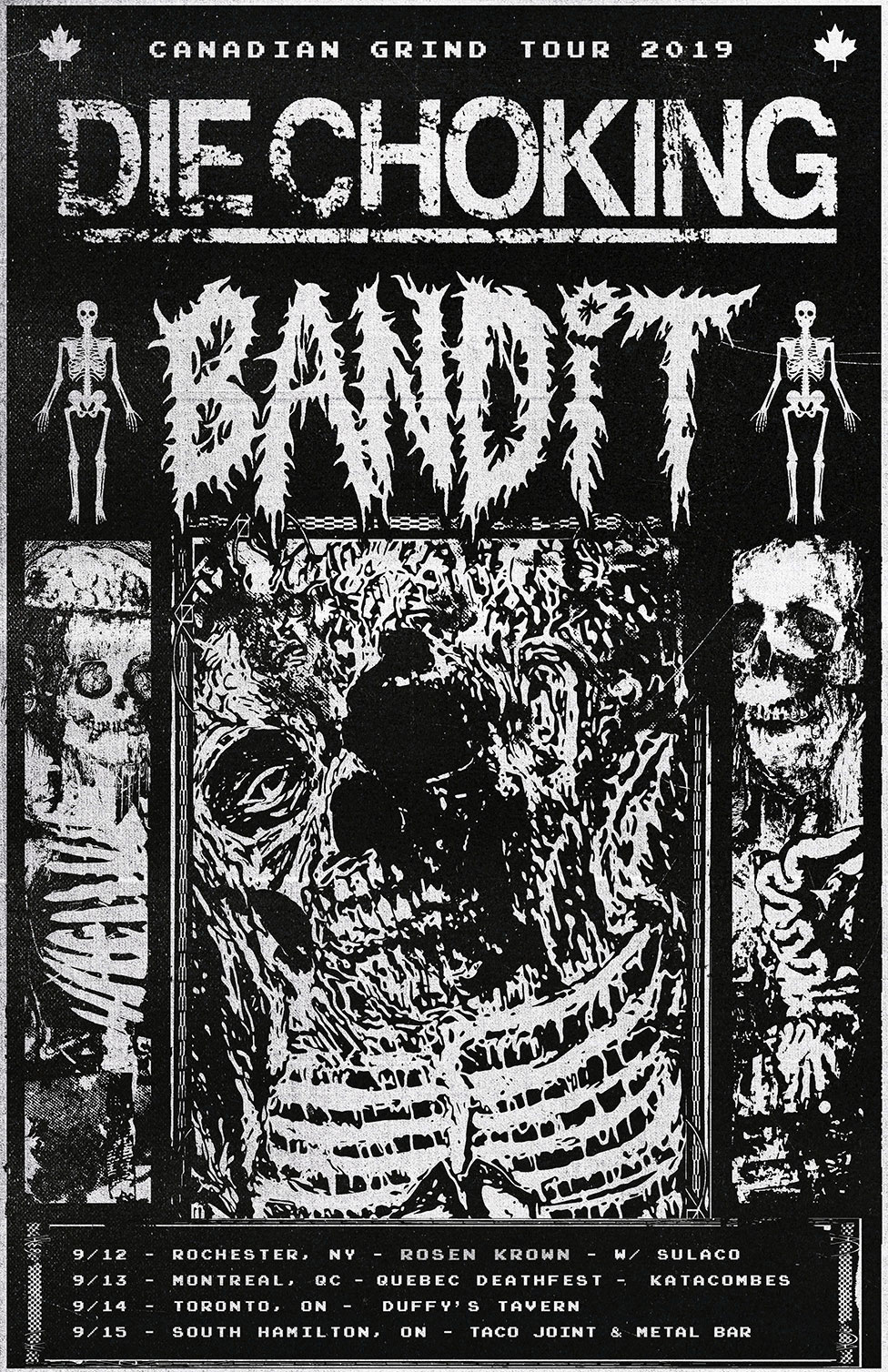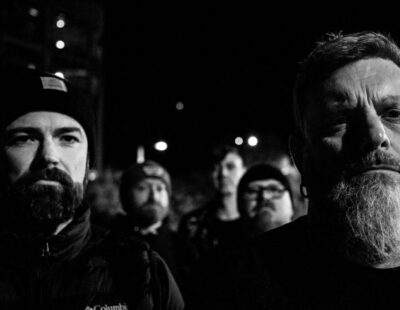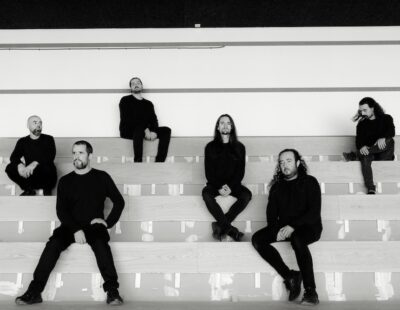
It’s been four long years—an eternity when you consider the length of your average grindcore album in comparison—since Philadelphia’s grind heavyweights Die Choking released their first album, III, but the wait has been worth it. IV is one of the most intense, cathartic and weird grindcore albums in recent memory, stretching far beyond what the trio have accomplished before.
Die Choking deliver the first single from IV in the form of track 11, “Mechanical Ventilator.” The 2:07 song is the second longest on the 13-track LP, but it feels anything but bulky. Launching immediately into jagged riffs and relentless blast beats that devolve into noisy, controlled chaos, “Mechanical Ventilator” is one of the most explosive tracks on a record that overflows with anger, grief, sadness and stress.
In addition to an exclusive stream of the album, Decibel spoke with drummer Joshua Cohen, bassist/vocalist Paul Herzog and guitarist Jeffrey Daniels about IV, grief, loss and turmoil at home. IV will see release on October 22 via DCIVE.
It’s been four years since III. What caused such a large gap?
Daniels: Four years full of a lot of serious events and experiences. Family comes first.
Cohen: Yup. We knew this process was going to be longer than any prior, but none of us knew it would take 4 years. When we wrote III, being prolific was a driving factor, if not our main impetus. Come 2017, there was a sense it was time to pay tribute or offer up something more painstaking. We knew IV wasn’t going to be quick, easy or painless.
Herzog: Totally, it was a bitch of a process and we spent a lot of time honing our songwriting and approach. We dialed in a lot that will make the groundwork for later releases much easier. The time also got me thinking about how to make better, more memorable songs. The reason I love a lot of those early Earache records like Altars of Madness, World Downfall and the first Accused is because of the killer, super-memorable songs. Sure, the playing is great but man…. those tracks stick to you.
Cohen: The push through in making it happen felt like an ocean of time. The process was frustrating and rewarding but had to play out on its own timeline. This endeavor coupled with a slew of life-changing events while we simultaneously laid the groundwork for an international, DIY release all took time.

Joshua, you lost a lot of loved ones in a short span of time leading up to IV. Does this music reflect the turmoil in your life at the time?
Cohen: Yes, very much so. The emotions experienced during that time period are rampant across the musical output of IV. Within a two-month span, I lost my father to a long battle with brain cancer (Glioblastoma), my grandmother passed a few weeks later, and Bagheera, my dog (who was the queen of our household and first pit bull I rescued over 15 years ago) also passed during that time. Needless to say, I was beside myself with grief, stress, anger, sadness, rage… the full gamut of human emotions that comes with repeated and severe loss. If nothing more, the explosiveness of the onset of those emotions is represented thoroughly in the music throughout the new record. I felt no choice but to try to power through and as best I could. I put a vast amount of effort just trying to stay focused on achieving a personally satisfying artistic endeavor through the storms.
Loss is not something that’s foreign or new to anyone in this band. Paul lost a close uncle to cancer during the recording of IV and lost his twin brother when they were just teenagers, music also being something they shared strongly. I think it’s safe to say that all of Paul’s artistic endeavors bear the mark of a brotherly imprint. I lost several very close friends in my early 20s and those experiences are imprinted throughout all of my subsequent artistic endeavors. Jeff is no exception either, he too lost a close friend during the creation periods of IV. I would guess pain and severe loss is something a wide swathe of people who choose to dwell in the arts and music cultures throughout the world share with one another.
The experience of losing my father to brain cancer also starkly brought into perspective the lives of people all over our world stricken by such things as war, famine, homelessness, having to exist without a home country, while at the same time having to care for a loved one dying from a terminal illness. This while the rest of the world turns a cold shoulder. The human experience and, to a further extent, human consciousness is something I’ve put a lot of time and energy into trying to better understand. All those feelings of rage, helplessness, confusion and the opposite positive charges of hope and efforts inject more positivity into the ether is all imprinted within the music of IV.
During this stretch Paul, Jeff and I became more like brothers than bandmates. And through near constant bickering, like brothers tend to do, we managed to lay the groundwork for what should allow us to have a more consistent output of music in the coming months and years. This too is imparted on the record and illustrates the ongoing dance between darkness and light.

This process ended up being a lot of very late nights into early mornings. I did not sleep much in 2018. There were more than just a few moments of doubt and severe meltdowns coupled with an unrelenting drive to push forward. All of that experience is wrapped up in my musical output on IV.
The music as a whole represents disease and the processes of dying and the emotional responses to it, but just as importantly, the music and energy put into IV represents rebirth and the explosion of positive energy associated with the other end of the equation.
Given all the turmoil going on, what was the writing process for this record like?
Daniels: The first few songs on the record were written the most organically, where we would trade off riffs and different rhythms and come up with sections of songs at a time and we spent a long time refining those songs. Even played a few of them on our tour with Mister Lizard from the UK two years ago. As we kept writing though we were all looking to try new things out. Paul and I made a serious effort to hae the guitar and bass trade off and on melodically, but also work percussively so when we come together with the drums for certain parts, it just crushes. We also went through three practice spaces throughout the process of writing. I definitely think it changed the tone of the record as it progressed. We originally were in the back of a mechanic’s shop in South Philly breathing in fumes writing weird riffs. Then we moved closer to my neighborhood and had a big room in a furniture upholstery warehouse, then that place sold and we had to pack up and move out and found a room nearby in an art space/ warehouse which sold in less than a year and we’ve since moved out of there.
Herzog: The thing about Die Choking is that it is truly collaborative. It’s not like there is ONE guy writing all the music. Good and bad, there is heavy, heavy contribution from all of us. Sometimes that causes delays as well, but I feel it benefits the originality to an extreme extent. We all got very adept at self-production during this record. Recording is a big part of our process now because of the time we put in during IV.
Jeff’s art was also a huge part of how we looked at making IV. Jeff went the polar opposite in regards to his previous work on III. The cover of IV is based around a yellow color theme and signifies the disease and craziness that was wrapped around us during the music’s formation. It is a painting/multi-format piece of art that is really gorgeous to see up close.
You mixed at Bricktop Studios in Chicago with Andy Nelson (Weekend Nachos, Jesus Piece). What was that experience like?
Daniels: Andy was great, he totally understood our sound. Paul and Andy found moments to add some memorable vocals and a few guitar effects throughout some of the songs that I think will stand out. We tracked with Dan Kishbaugh and he nailed the guitar tone.
Cohen: Andy is the man. I felt like we put him through the fucking ringer on this mix and he hung in and thoroughly dialed in what has become the 13 songs that best represent our musical vision as a group. We had a very strong set of ideas of how we wanted to paint a good portion of the soundscapes throughout the LP, a lot of which was a step or two out of the norm in terms of how instruments are generally EQ’d and balanced in a very fast mix. Andy also managed to pull us down from the stratosphere when our ideas started to enter outer space. We had tracked with Dan in Philly in April and May of 2018 where I recorded a literal ton of extra takes and versions of the drumworks. Because we’ve been practicing and writing everything to the metronome for the past couple of years, I was able to ram through a lot of takes live in the studio and then take the tracks from there and work on alternate sequencing, comparing versions until I found the ones that executed the musical vision the best.

Tell us about the song debuting today, “Mechanical Ventilation.” What is the song about and what was the writing process for it like?
Herzog: Ha, funny story: The main riffs for this song were written when my guitar almost electrocuted me. I was at our rehearsal space during an afternoon just jamming ideas at full volume. I had to change a string and hadn’t cut the long string end off from the tuning peg. As I was playing, I turned and the end of the string slipped into the plug of an extension cord that was hanging from the ceiling. That string fucking lit up like a goddamn light saber and my whole guitar neck was glowing until the string popped as I threw the thing off over my head. Man, I had electrical burn marks on my hand. Shit was crazy.
Ironically, “Mechanical Ventilator” is about people’s over-reliance on technology to a fault. We have such amazingly advanced instruments in science and medicine but I feel sometimes their usage can be taken to extremes. In particular, when these tools are used to prolong the inevitable and bypass the importance of dignity during the dying process. Most people refer to mechanical ventilators as “breathing machines.” It’s an amazing tool for surgery and helping people survive severe, critical illnesses but can sometimes be used to a fault.
Daniels: Musically it’s one of the faster songs on the record at like 230 bpm or something. It starts off super rigid and mathy and ends up in a reckless dissonant bunch of exasperated chaos.
Cohen: This was one of the more difficult drum tracks for me to pin down. It’s a very fast song and has a lot of twists and turns and signature shifts. At the time this track was being molded I had just started dabbling with more linear beats and the middle section, odd-structured linear sequence on drum took me more than a few hot sessions of practice to nail down. I tend to play very emotionally and that’s one part I really had to sit a dial in before I could go nuts on it.

SEPT 13 – Montreal, Quebec Deathfest II at KATACOMBES
SEPT 14 – Toronto, Ontario – Duffy’s
SEPT 15 – Hamilton, Ontario – Taco Joint & Metal Bar (Early All Ages Matinee)







